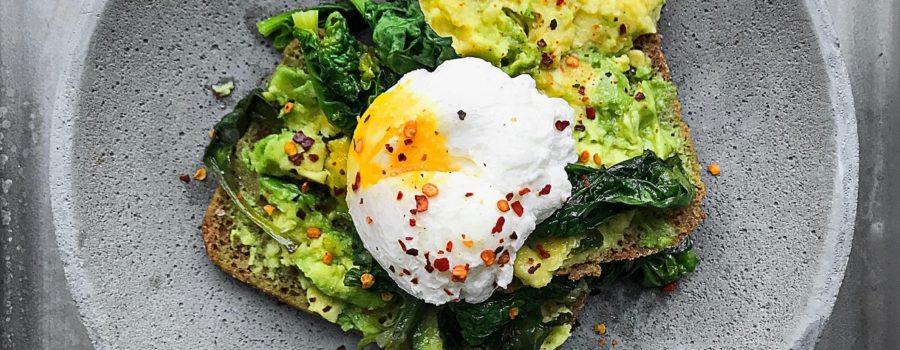 “The incredible egg.” Breakfast staple, meatball binder, cake raiser…baby grower? The tiny, but mighty egg is a high-quality protein and nutrition powerhouse. Eggs contain a large range of nutrients, but are especially high in a few nutrients key to fetal growth during pregnancy. Eggs are high in choline, a B vitamin necessary for optimal brain growth and cognitive development. The National Institutes of Health estimates that “90-95% of pregnant women consume less choline than the AI [adequate intake].” This is alarming because choline influences a child’s cognitive abilities. A study published by The Journal of Pediatrics found that the infants of mothers with higher levels of choline during pregnancy were less likely to develop certain mental illnesses following maternal infection while in the womb.
“The incredible egg.” Breakfast staple, meatball binder, cake raiser…baby grower? The tiny, but mighty egg is a high-quality protein and nutrition powerhouse. Eggs contain a large range of nutrients, but are especially high in a few nutrients key to fetal growth during pregnancy. Eggs are high in choline, a B vitamin necessary for optimal brain growth and cognitive development. The National Institutes of Health estimates that “90-95% of pregnant women consume less choline than the AI [adequate intake].” This is alarming because choline influences a child’s cognitive abilities. A study published by The Journal of Pediatrics found that the infants of mothers with higher levels of choline during pregnancy were less likely to develop certain mental illnesses following maternal infection while in the womb.
The recommended AI (adequate intake) for pregnant women is 450 mg per day (and even higher for breastfeeding women, at 550 mg). To make matters worse, many prenatal vitamins don’t contain any choline. Beef liver and eggs are the highest food source of choline, so unless beef liver is a regular part of your diet (I’ll write a separate post on liver at some point), it takes a combination of eggs and many other foods to even attempt to get to the recommended daily value for choline. Two eggs contain approximately 250-300 mg. Besides being a great source for choline, eggs are also high in riboflavin, vitamin B12, biotin, iodine and selenium.
One thing to keep in mind when consuming eggs is that the yolk contains a large portion of the aforementioned nutrients. If you’re only eating egg whites, you’re missing out on a lot of what the egg has to offer you and your baby. Years ago, eggs, specifically the yolks, were demonized as a cholesterol-unfriendly food. Many studies have been conducted since then that debunked this fear and found little to no link between dietary cholesterol raising blood cholesterol. Other aspects of your diet, like consumption of unhealthy, processed fats and sugar, have far greater impact on your blood cholesterol and its link to heart disease. In fact, one or more studies have found that egg consumption increased HDL levels (the good cholesterol that we want to elevate). One thing to note, however, was that individuals with diabetes were more likely to experience elevated blood cholesterol levels by consuming high cholesterol foods such as eggs. If you are an individual living with diabetes, you should consult your doctor before increasing your egg intake.
With this in mind, two eggs a day (with the yolks!) is a great way to increase your choline and B12 intake and provide high-quality protein for your baby. Here are a few ways I eat my two eggs a day:
- For breakfast, over-easy with half a slice of toasted homemade sourdough bread with grass-fed butter
- For breakfast, scrambled with cheese and eaten alongside a quarter or half an avocado
- As a snack or breakfast, hard-boiled, with sea salt and freshly-cracked black pepper
- As a snack, deviled (I’ll share our go-to recipe soon – they’re delicious!)
- As a snack, hard-boiled and marinated using this recipe
WHAT EGGS SHOULD I BUY?
Choosing what type of eggs to buy can feel intimidating. You’re confronted with many different brands, terms and prices. The thing to keep in mind when purchasing eggs is that the closer hens are to living in what would be considered their natural environment, where they can peck at bugs and worms in the grasses, the greater the nutrient profile and levels of Omega-3 fatty acids. Omega-3 fatty acids are another essential nutrient for cognitive development and growth of your baby. Plus, hens that are living closer to how they were designed to live (foraging on pasture) are living a higher quality life, which I believe impacts the quality, taste and nutrition of the eggs they produce. Crack an egg from a non-organic, cage-free carton and then crack an egg that’s from a hen raised on pasture and the difference will be obvious. The pastured egg will have a brighter, more vibrant colored yolk. I notice a definite difference in taste, too – pastured eggs have more flavor than non-pastured eggs. That’s typically why you’ll hear others who tout the taste of “farm fresh” eggs over store-bought.
First, look for organic eggs. Organic eggs are laid by hens whose feed is entirely organic and non-GMO, and it is a USDA-regulated certification, meaning farmers have strict guidelines to meet and serious consequences when they don’t. Most laying hens’ diets in the U.S. contain corn and soy, two of the biggest GMO crops in our country. Buying organic means that any corn or soy used in their feed is non-GMO, and also that all food sources are free of pesticides and harsh chemicals. Organic feed is also vegetarian. While hens are not vegetarians (they eat bugs), they wouldn’t be found eating other birds, fish or other meat sources for food.
It gets a little trickier beyond the organic label. Cage-free and free-range are also USDA-regulated terms, but the quality of life for these hens doesn’t differ much between the two. Free-range hens have access to outdoors, but that simply means a door is available and if they tend to stay by their food source, they’re likely not seeing the sunlight that often. “Pastured” or “pasture-raised” are not USDA-regulated terms, so seeing these on a carton doesn’t tell you very much about how the hens are living and eating. Certified Humane is a third-party label run by Humane Farm Animal Care (HFAC), which is a highly-acclaimed nonprofit organization “dedicated to improving the lives of farm animals in food production from birth through slaughter.” Organic eggs that have the Certified Humane label AND say “pasture raised” are ideal. Certified Humane pasture raised eggs are laid by hens who spend their days outdoors foraging the vegetation and exhibiting natural behaviors.
Governmental and third-party certifications are expensive for farmers to obtain and maintain. So, don’t assume that your local farmers market eggs don’t meet the criteria mentioned here. Talk to your local farmers and learn about their feed processes and how their hens live on the farm to make the decision that’s right for you. There are also name brands that don’t have the Certified Humane label, but publicize the practices they use to provide a higher quality of life for their hens, like Organic Valley.
You may have also seen eggs labeled as “Omega-3” eggs. These are hens whose feed is supplemented with additional Omega-3 sources, most commonly flaxseed oil. I would like to see a study conducted comparing the Omega-3 and overall nutrition profiles between an egg from a pasture-raised hen and that of an “Omega-3” hen, however, no such study has been conducted. The eggs of pasture-raised hens have greater Omega-3 fatty acid profiles than those that are cage-free and free-range, but how do they compare to eggs that come from hens who are supplemented with Omega-3? I like to think that it would be preferable to get your nutrition sources through the most natural sources, and obviously a hen supplemented with Omega-3 is not natural. However, I would be interested in learning more. If you do choose to purchase Omega-3 eggs, I would still suggest buying organic.
I realize that purchasing the quality of eggs suggested in this post comes with a price tag. You may find yourself paying 2-5 times what you’d pay for cage-free, non-organic eggs. Remember that you are nourishing your body and your growing baby with whatever it is that you’re ingesting. For me, it was easy to justify paying more for my eggs and reducing part of my budget elsewhere to accommodate higher quality food. I realize not everyone can make that choice. If buying organic, pasture raised eggs isn’t in the cards for you, buying organic eggs would be the next best option, followed by non-organic cage free or free range eggs.
I also understand that it takes time to learn about the egg producers available to you in your grocery stores or farmers market. Realize that the time is an investment in the health of you and your baby. Once you’ve done the work, you can buy eggs confidently and quickly – and enjoy the better taste that higher quality eggs produce, too!
Warm regards,
Brianna
Sources:
- https://ods.od.nih.gov/factsheets/Choline-HealthProfessional/
- https://www.aeb.org/retail/nutrition
- https://www.incredibleegg.org/
- https://www.ams.usda.gov/







